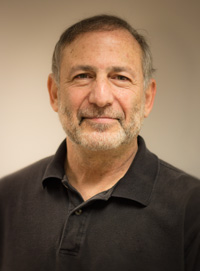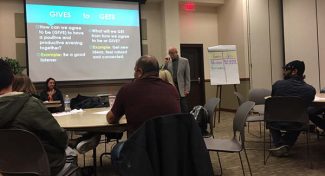A quiet revolution is in the works. When life feels like a blur, turn to mindful living practices to ground yourself, take a breath and slow down.
The first of many intended monthly community conversations about mindful living practices was held Thursday evening in the Dugan-Gorges Conference Center. It was hosted by Wichita in Mind along with the Newman University School of Social Work and School of Education and was attended by nearly 30 community members.
Founders of the series, Mindful Conversations that Unite, say they hope the meetings will last for years to come.
Being mindful can mean many things but focuses on being fully present in the moment, being non-judgmental and giving your full attention to the person or task at hand.

Associate Professor of Education Steven Dunn, Ed.D., said, “The main goal of the series is to introduce mindfulness living, or to support those who practice while addressing issues that we deal with as a community.”
This particular meeting focused on engaging in conversations that unite rather than divide.
The mindfulness movement began in Wichita after Associate Professor Michael Duxler, Ph.D., attended an international conference in San Francisco during which congressman Tim Ryan gave a presentation on his book, “A Mindful Nation.” Ryan was hoping to start a quiet revolution. Though his dream was big, he thought it would be best to start on a smaller scale — preferably a city in the middle of the United States. Duxler was in the audience and contacted Ryan a few days later. It was decided between the two; Wichita would become the first mindful city.
After the conference and his conversation with Ryan, Duxler contacted colleagues at Wichita State University’s psychology program and Friends University’s marriage and family therapy program to gauge their interest. This became a tri-university project.
Up until now, the focus of the movement has been on the area schools in hopes of creating a solid foundation for mindful living practices to grow organically into the community.

Duxler said, “Head Start has been using mindfulness in the classroom for years with phenomenal success.”
When the concept was first introduced, Head Start Director Linda Wilcox held a mandatory mindfulness meeting for her 220 employees. Wilcox said that “they came kicking and screaming.”
Now, mindful living practices are used throughout the Head Start program and teachers enjoy their use and have seen the positive results it has provided in their classrooms.
This first community conversation was a long-awaited beginning to spreading the program from the school to the community of Wichita. Dunn said, “We want the ripple effect of mindfulness living throughout the entire community and beyond.”
The organization now has a board of directors who work to try and organically bring mindful living practices to the community. As for the monthly gatherings, Duxler said, “More and more people can know what mindful living is like and be able to practice. We are not experts, we’re learning as we go and we just want to be a conduit.”
Duxler and others involved in the organization have gone through significant training in regards to mindful living practices. He said they are “finally ready to converse with people in the community about this and see where we go from there.”
Duxler was unsure how the first meeting would go or who would attend. “The bottom line is for them to know a little bit about Wichita in Mind, what we’re here for and what our purpose is,” he said.
Newman student Lexy Cochran is taking an NSP course called “The Art and Craft of Happiness,” taught by Duxler. The course was created in parallel to the mindfulness movement.
She said, “I think what surprised me most is the fact that I’m actually taking this to heart.” She said she questioned the legitimacy of the idea before the course began; being a biology major, she thought there was no way to teach her how to not stress out. Now that she’s committed to the course she said things have changed for her. “I’m quick to take in the positives, which I don’t normally do.”
The course appeals to a wide variety of majors. It covers some science, like the basic anatomy of the brain, as well as psychology, meditation and more.
The goal of the community conversation was for the tables of participants to make connections, come up with new ideas, and learn. Dunn created table discussions based on questions like what being mindful means to us, what we can give others and gain in return.

When Dunn completed his portion of the meeting, it was turned over to a panel of seasoned practitioners who have been implementing mindful practices into their lives for some time. The panel included the creator of Retreat to Joy, Connie Porazka, counselor Scott Sprandlin and WSU student advocate Rheanna Pierce.
The panel gave background on themselves and answered questions from the community about how they deal with situations mindfully, how these practices have made a change in their lives and challenges they’ve come across.
Porazka said, “When you connect with yourself and you connect in mindfulness, you discover your own true joy.” She said finds joy and peace through daily meditation.
Sprandlin mentioned how his life has improved since implementing mindful living practices, saying he finds joy in simple things. Instead of worrying about what he’s going to encounter at the office or on his way to work, or what he’ll be doing after the workday — he lives in the moment and says he’s taken notice of things like he never has before.
Pierce spoke heavily of her work with Wichita State University students. She said a key in her life is to walk out the door every morning with intent for her day.
Join the conversation on Dec. 7 at Milk Float in the Delano District. Gina Marx, associate professor of education, will present “Holidays with Less Stress: Mindful Living Practices for Being Your Best You” at 6:30 p.m.

